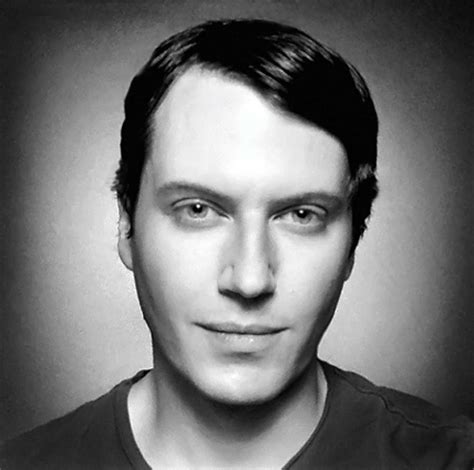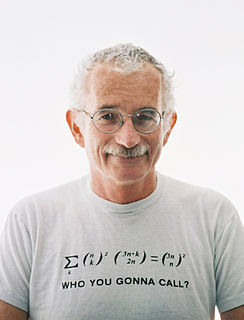Top 132 Algorithms Quotes & Sayings - Page 2
Explore popular Algorithms quotes.
Last updated on November 8, 2024.
There are lots of different ways that algorithms can go wrong, and what we have now is a system in which we assume because it's shiny new technology with a mathematical aura that it's perfect and it doesn't require further vetting. Of course, we never have that assumption with other kinds of technology.
Facebook has become the richest and most powerful publisher in history by replacing editors with algorithms - shattering the public square into millions of personalised news feeds, shifting entire societies away from the open terrain of genuine debate and argument while they make billions from our valued attention.
Scientists need the infrastructure for scientific search to aid their research, and they need it to offer relevancy and ways to separate the wheat from the chaff - the useful from the noise - via AI-enabled algorithms. With AI, such an infrastructure would be able to identify the exact study a scientist needs from the tens of thousands on a topic.
So much of the language that surrounds us - from things like economics, management theory, and the algorithms built into computer systems - appears to be objective and neutral. But in fact, it is loaded with powerful, and very debatable, political assumptions about how society should work and what human beings are really like.
Competitors argue that Google rigs its search algorithms to demote listings for competing search engines. Many of the allegations of demotion come generally from sites of pretty questionable quality, such as Nextag and Foundem. Some of Google's primary competitors in 'specialized search' clearly place well in search results - Amazon and Yelp.
Many [business] people focus on what is static, black and white. Yet great algorithms can be rewritten. A business process can be defined better. A business model can be copied. But the speed of execution is dynamic within you and can never be copied. When you have an idea, figure out the pieces you need quickly, go to market, believe in it, and continue to iterate.
The classes of problems which are respectively known and not
known to have good algorithms are of great theoretical interest. [...]
I conjecture that there is no good algorithm for the traveling
salesman problem. My reasons are the same as for any mathematical
conjecture: (1) It is a legitimate mathematical possibility, and
(2) I do not know.
We do know that we can set certain algorithms for machines to do certain things - now that may be a simple task. A factory robot that moves one object from here to there. That's a very simple top-down solution. But when we start creating machines that learn for themselves, that is a whole new area that we've never been in before.
One of my optimistic prophecies is based on the assumption that machines could have the best algorithms in the universe, but it will never have purpose. And the problem for us to explain purpose to a machine is because we don't know what our purpose is. We have the purpose, but we still ... When we look at this global picture, a universal picture, to understand what is our purpose being here on this planet? We don't know.
When The Daily Muse initially wanted to launch a job board, our first ideas were insanely (and needlessly) complex. We wanted to integrate with social networks, gather rich personal data to build predictive algorithms, and put together numerous cool visualization tools before launching out to the world. We were just sure users would love it!
I'm not anti conceptual art. I don't think painting must be revived, exactly. Art reflects life, and our lives are full of algorithms, so a lot of people are going to want to make art that's like an algorithm. But my language is painting, and painting is the opposite of that. There's something primal about it. It's innate, the need to make marks. That's why, when you're a child, you scribble.
Despite the metadata attached to each tweet, and despite trails of retweets and 'favorite' tweets, the Twitter corpus lacks the latticework of hyperlinks that makes Google's algorithms so potent. Twitter's famous hashtags - #sandyhook or #fiscalcliff or #girls - are the crudest sort of signposts, not much help for smart searching.
Some people have set up sort of "gotcha" algorithms that apparently crawl through psychology articles and look for fraudulent p-values [a measure of the likelihood that experimental results weren't a fluke]. But they're including rounding errors that don't change the significance levels of the results, and they're doing it anonymously.
Enchanting is not the word that would immediately spring to mind when describing a play that deals with fractal geometry, iterated algorithms, chaos theory and the second law of thermodynamics, but it is a perfect fit for Tom Stoppard's astonishing 1993 play, which is as beautiful as it is brilliant. This is one Stoppard drama that you don't have to be Einstein to understand -- you can feel it as well as think it. (...) Breathtaking, exhilarating and deeply satisfying.
Fantasy sports went a long way toward developing the sabermetrics formulas used not only by oddsmakers but general managers in hiring players. So the amateur fantasists ended up creating some of the algorithms that Oakland GM Billy Bean's statisticians used to win games with less salary money available for star players.
We have a lot of argument about laws but none of it solves the problem. Let's examine what happened, why did we miss the Tsarnaev brothers, why did we miss the San Bernardino couple? It wasn't because we had stopped collected metadata it was because, I think, as someone who comes from the technology world, we were using the wrong algorithms.
On a strategic level, employers really are behaving stupidly. Look at how they do recruiting: this automated process under which they will publish a job description chock full of so-called "key words", and then have software algorithms that attempt to match applicants to the resumes against those key words. So where in the key word collection do we capture institutional knowledge? No one advertises for that. Of course they don't.
Leibniz endeavored to provide an account of inference and judgment involving the mechanical play of symbols and very little else. The checklists that result are the first of humanity's intellectual artifacts. They express, they explain, and so they ratify a power of the mind. And, of course, they are artifacts in the process of becoming algorithms.
Is any job safe? I was hoping to say 'journalist,' but researchers are already developing algorithms that can gather facts and write a news story. Which means that a few years from now, a robot could be writing this column. And who will read it? Well, there might be a lot of us hanging around with lots of free time on our hands.
We don't let a car company just throw out a car and start driving it around without checking that the wheels are fastened on. We know that would result in death; but for some reason we have no hesitation at throwing out some algorithms untested and unmonitored even when they're making very important life-and-death decisions.
Netflix will know everything. Netflix will know when a person stops watching it. They have all of their algorithms and will know that this person watched five minutes of a show and then stopped. They can tell by the behavior and the time of day that they are going to come back to it, based on their history.
With recidivism algorithms, for example, I worry about racist outcomes. With personality tests [for hiring], I worry about filtering out people with mental health problems from jobs. And with a teacher value-added model algorithm [used in New York City to score teachers], I worry literally that it's not meaningful. That it's almost a random number generator.
I just thought making machines intelligent was the coolest thing you could do. I had a summer internship in AI in high school, writing neural networks at National University of Singapore - early versions of deep learning algorithms. I thought it was amazing you could write software that would learn by itself and make predictions.


















































